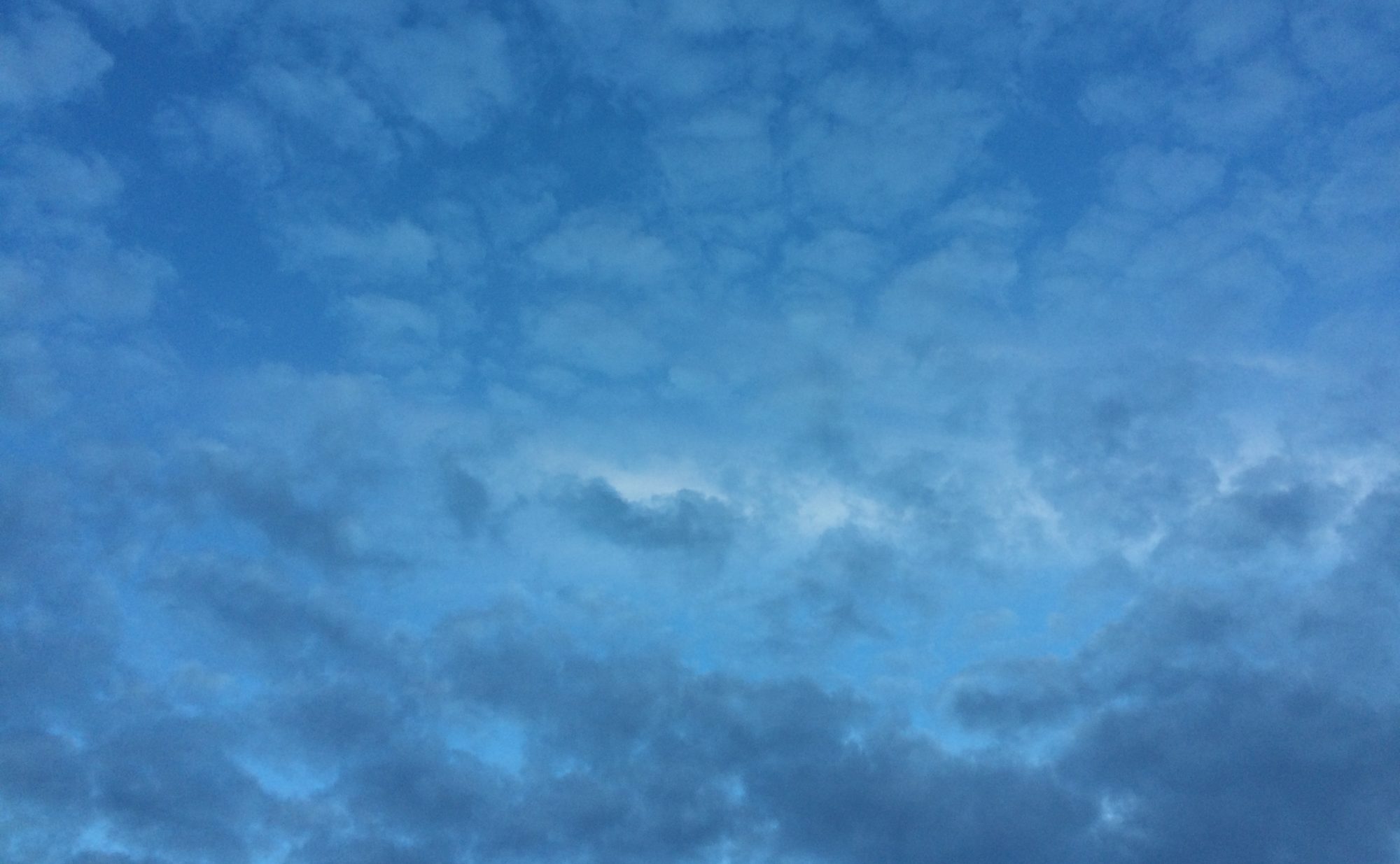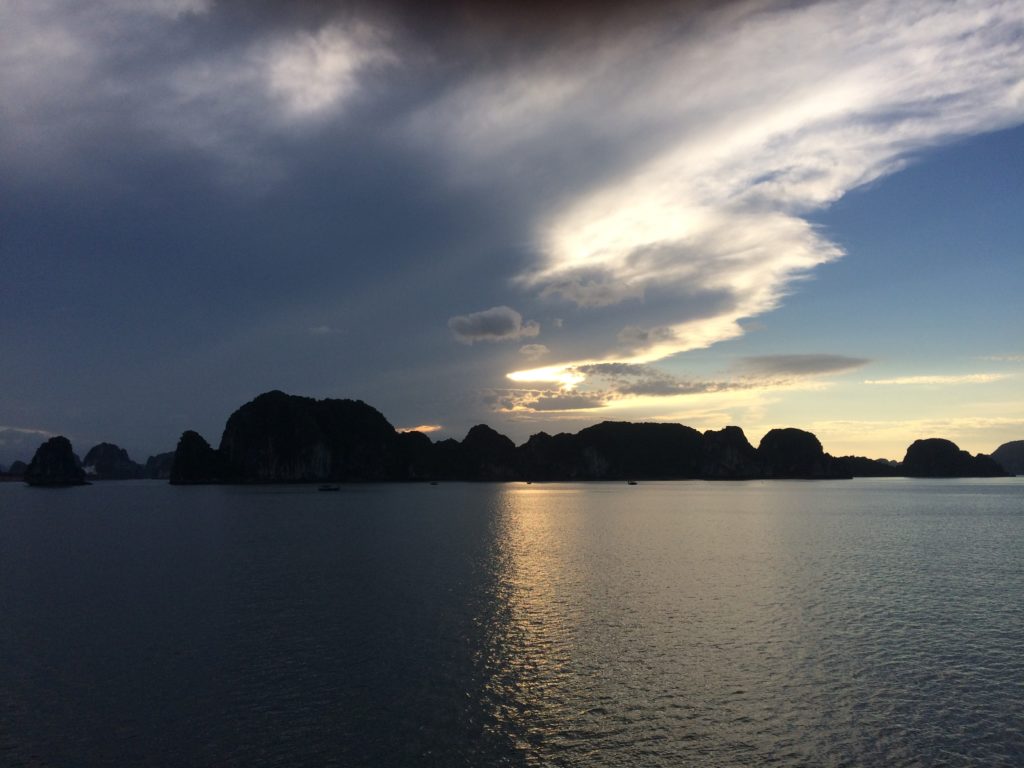
I am bobbing, as I write this, on the deck of a small junk in Ha Long Bay, not far from the Chinese border, off the coast of northern Vietnam. At the moment the stars are spilled across the sky. The moon, just past full, has not yet risen over the karst – a limestone monolith, this one tooth-shaped and several hundred feet tall – that rises out of sea a quarter mile away.
There are about 2000 of these giant stones ascending from the sea (or, rather, falling into it – ha long means "descending dragon" in Vietnamese). Some are shaped like elephants, others like frozen waterfalls, some like ruined temples or odd amalgamations of skyscrapers.
It is one of the most amazing things I have ever seen.
I will stay here until the moonlight wipes up the stars.
Do we move through time, or does time move through us?
My attention falls on my laptop, then back to the sky and the sea and the stones, trying to experience it without words, and then record it the linguistic code I know.
I try to exist in the moment, but I keep slipping into the present instead.
The Point of Vacationing
Why travel? To break out of your normal patters of living. It's not simply escaping from someplace, though. These karsts have knocked me out of regular ways. They're a very vivid reminder that I'm not at home, and that there is another way of living.
You can't just turn off your everyday life without turning something else on in its place. Vacations give you the chance not just to see different places and things, but to see them differently.
But how do you experience something differently? Lots of ways. I've been thinking about happiness and time lately – and I'll follow on that with that thread here.
Time
Labor Day is coming.
Summer is passing by.
English has a couple of ways of dealing with time, but this is the most common: the idea that we're moving through it.
But do we move through time, or does time move through us?
Are we pushing through time, like the shallow end of a swimming pool, growing older with each step, or does it penetrate us like neutrinos and radio waves?
Is Labor Day coming, or are we about to engulf it?
I remember studying Immanuel Kant in college, impressed by his suggestion that time and space were products of the human mind – ways of organizing our experiences, so that we could make sense of them. If we couldn't envision objects in space, as separate from one another, or construct events in time, there would be nothing to think about and no way to know.
Try to conceptualize what it would be like to be a creator-god, existing before the creation of time and space, looking at it from outside. To this god, all of history would appear to happen simultaneously (at least, that's the best I can do to describe something English was not made for); every moment would be visible at once. And everything would appear to be in the same place. It's not really possible to imagine this because all of our experiences are filtered through time and space, but it helps a little bit in giving you the inkling about how raw, unfiltered, unorganized reality needs to be parsed out and structured in our brains.
Time and space may exist without us, but the ability to perceive them are built into our beings.
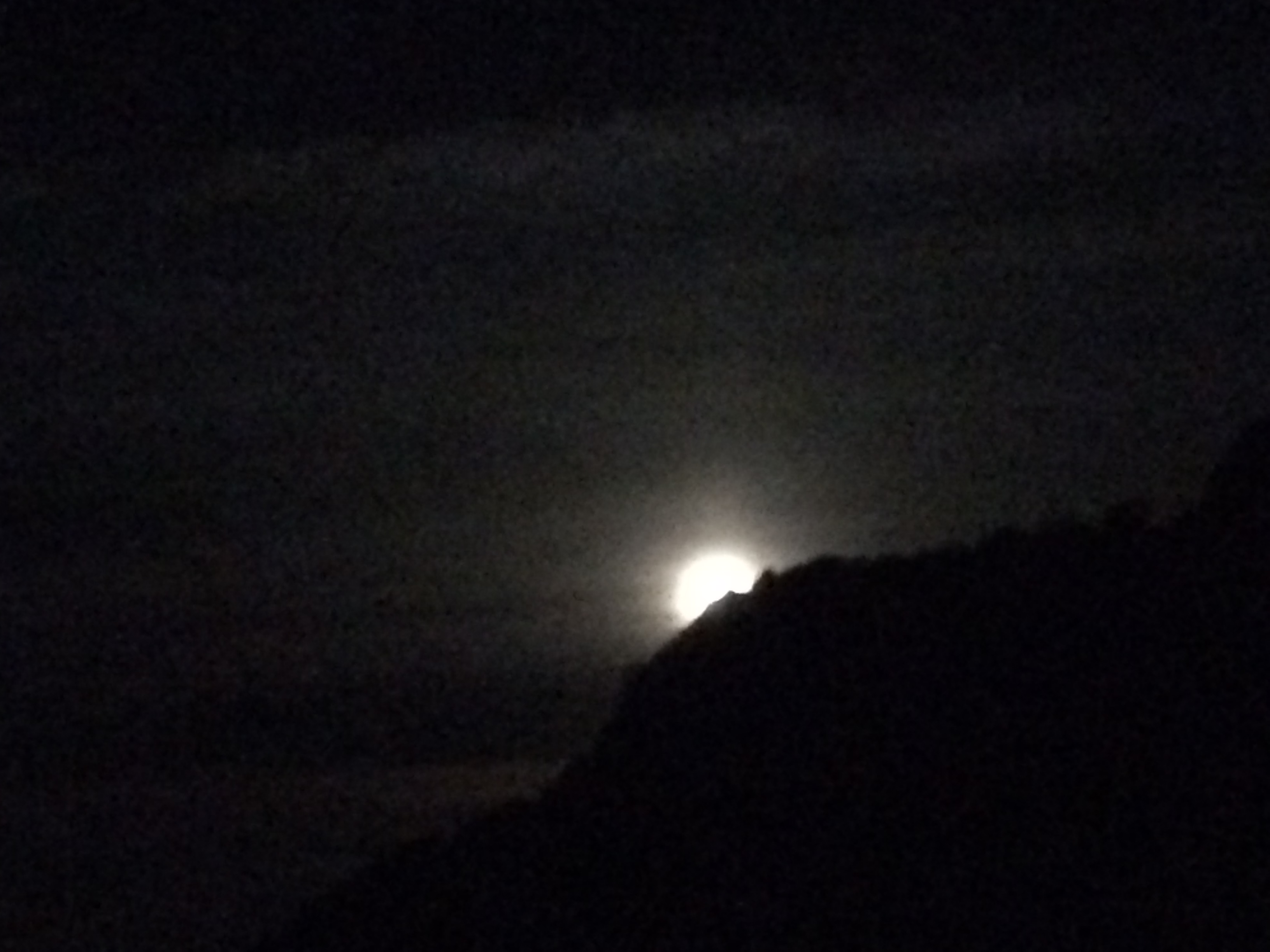
Try to conceptualize what it would be like to be a creator-god, existing before the creation of time and space, looking at it from outside. To this god, all of history would appear to happen simultaneously. (At least, that's the best I can do to describe something English was not made for.) Every moment would be visible at once. And everything would appear to be in the same place. It's not really possible to imagine this because all of our experiences are filtered through time and space, but it helps a little bit in giving you the inkling about how raw, unfiltered, unorganized reality needs to be parsed out and structured in our brains.
Time and space may exist without us, but the ability to perceive them are built into our beings.
Types of Time
It's not hard to understand the fact that we can look at things in different ways. We can interpret an event emotionally, or logically, or ironically. We can attribute it to luck or karma or fate.
Less obvious, but equally true, is the fact that we process time in different ways. It moves quickly, it moves slowly. In flashbulb memories it seems to stop. Some memories fade into the distant past almost as soon as they happen. Intense experiences – the first kiss that felt right, the moment I flew off my bike and shattered my left arm – they feel like they could have happened this morning.
We aren't passengers floating through time. It permeates us. Time moves through us. Time- or, at lest, our perception of it – moves because of us.
If our experience of time comes from us, then in one way, we create it. And, of course, it creates us as well – our senses of our histories, and the histories and futures of the world around us.
Marketing the Moment
Halfway between Hanoi and Ha Long, our little tour bus stopped at a sort of vacationer's purgatory. Air-conditioned to twenty degrees below the ambient June heat, it was the purist distillation of tourist kitsch I'd encountered in Vietnam – pointed straw hats, lacquered jewelry boxes, laughing Chinese dragons carved in pink stone for sale, all far above market-value. You're dropped off at the front door. The bus fuels up on one side and, after twenty minutes' penance wandering among the tchotchkes, you board it again at the back. (Just who was paying who was never clear. Whether the tour companies contracted with the pit stop, or whether the store owners gave Ethnic Travel a kickback for bringing us there remains unknown to me.) The place was full, though. Such is the draw of Ha Long Bay, and the power of the tourist dollar.
The city of Ha Long itself is growing rapidly. It's on a major road heading south out of China and a few hours north of Hanoi. Stimulated by nature-tourism, the population has grown to several hundred thousand.
Money is pouring in. Condos and resorts popping up like mushrooms.
As in many cities in Vietnam, an airport is being built.
A enormous red Ferris wheel – the city's most visible landmark – appears to be glued to the roof of a casino at the top of a limestone cliff.
I took a picture of it, tiny in the distance, framed between two karsts in the bay.
The karsts themselves constitute a UNESCO World Heritage Site. Pushed up by tectonic forces then shorn down by the movement of water through the porous stone, they are the result of twenty million years of nature doing its work.
If we create time in different ways (or, as I said, our perception of it, which, for all intents and purposes, is the same thing) then there may be times when we have the power to choose which way to interpret it. Nature "doing its work" suggests one specific vision of time – to think about time as progress, moving forward. (It's very hard to get out of this way of seeing things, as I explain here.) Through this lens, what makes an experience coherent, and what makes an activity meaningful, is progress toward a goal.
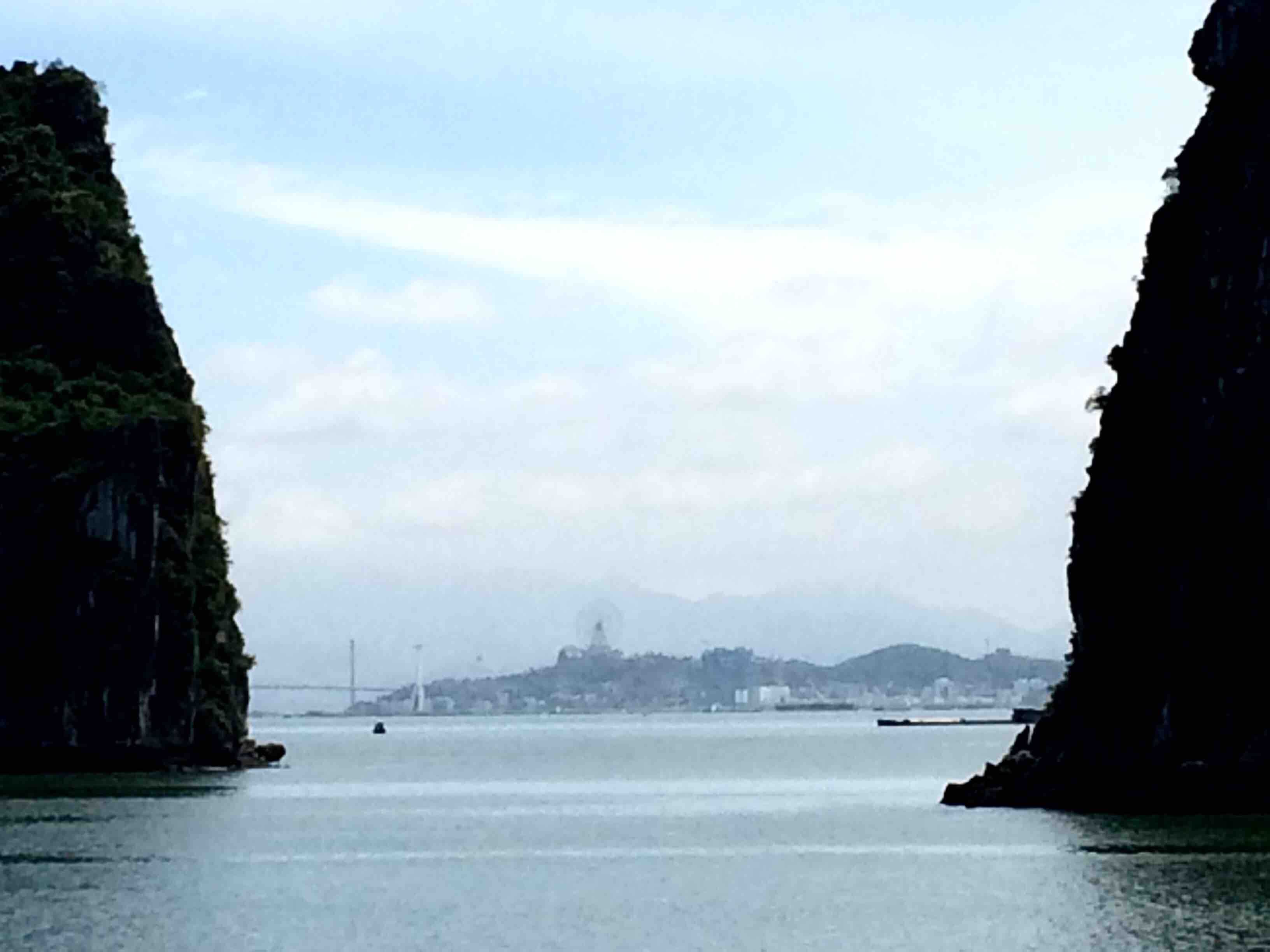
So much of American life is built around the idea of goals built upon goals built upon goals.
Being in the present is not so hard to do. It's just a state of self-awareness. But the concept of the present brings some big ideas along with it. You can't have it without the past and the future – and with them come the awareness of heading someplace – of change, and the fact that no present is perfect enough to last forever.
Momentary Existence
Being in the moment is something else entirely. It's also a form of self-awareness, but it is without attending to what precedes and follows it. It's a sort of timeless time. Looking for meaning in goals, then, doesn't apply here.
It's a slippery experience. It can be hard to slip into, given the goal-driven ways we live our lives, and easy to slide out of.
The sensation is difficult to describe. It's like forgetting you're holding your breath. A sort of practiced distraction away from everything that distracts you. I can never stay in it, but once I knew how it felt it became easy to knock myself out of the present and into the moment often. (That's why I moved between the stars and my laptop.)
With no goals to pursue, it is simply experiencing, existing with the sea and the stones and the sky, that gives meaning to this way of being,
This is a comfortable form of existence every now and then. You can fail at seeing the world in the moment, simply through lens of your own human existence, but you can't fail to exist. It's a clean path to one form of happiness.
The junk itself – small, old, and a bit creaky, with a few nail-heads poking above the top deck's painted floorboards – is a product of the tourist industry. It is quite unlike the fishing boats the name implies. The passenger compliment is also quite small. There are beds and seats in the dining room for 16, but there are only seven passengers – myself, my friend Benton (who, for two weeks, has become my travelling companion as well), a friend of his from England, and four young Canadian.
With Andrew (from England), we commiserated over the recent political disasters that have befallen our countries. The Canadians wanted to talk about health insurance and how hard it has become to buy a starter-home in Vancouver.
Out of the moment and into the present.
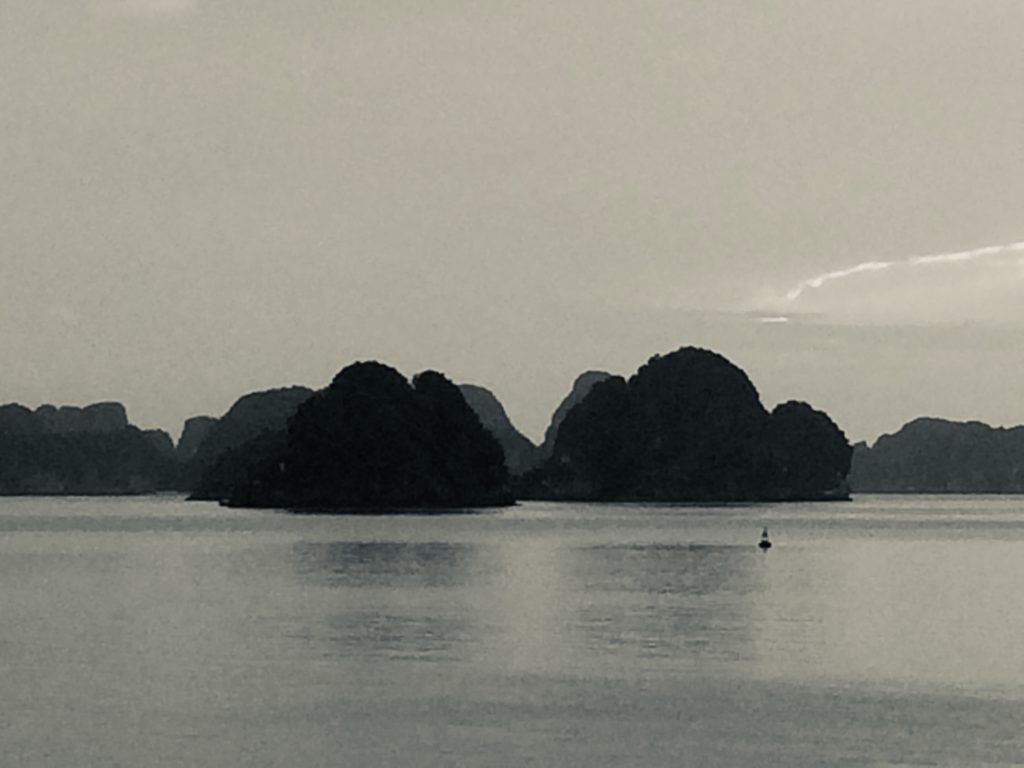
Into the Moment
There are other ways to get out of the present, to remove yourself from your ordinary life. You can immerse yourself in imagination as well – drawing on your visions of far off-lands and exotic places. Plunging into someone else's present – if you can plunge completely – can move you into your own moment.
"This place will be crazy in five years," Benton says. Ours wasn't the only boat littering the bay. (Is that music from a karaoke machine, gliding across the water's surface from some distant ship?) Once the airport is finished Ha Long Bay won't just be accessible from Hanoi and Southern China. Who knows what the city of Ha Long will become – Vietnam's Vegas? Will tourist purgatories become the norm?
Whatever the case, change, as we all know when we live in the logical, linguistic present, is inevitable.
I don't care to think about this. For now, it's best to slip out of the present and into the moment, into the water and stone and stars. To slide outside of normal time, like some semi-demi-creator god, to realize that we are permeated by time and also its inventors, that without our intention, we create the time to rise the moon, the time to build a city, the time to carve a karst.
